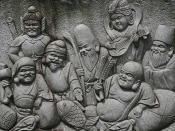Before continuing with the Bible survey, we would like to interject a few sentences to explain the historical perspective used in preparing it. All attempts to place Joseph, Moses, and the events in Exodus alongside a secular, historical timeline proved unsatisfactory -- frustratingly so. There are educated opinions too numerous and complicated to reconcile. Anyone who claims to have the definitive word on which dynasty Joseph served or which pharoah withstood Moses or drowned in the Red Sea does so under the weight of a truckload of assumptions and inferences.
Now, back to the study of the Biblical narrative, which does not attempt to satisfy our endless human curiosity, but instead beckons us to know the motives, wisdom, and faithfulness of a God who not only created man, but also continually reaches out to offer him redemption and fellowship.
After Joseph's death, the Hebrews continued to live in Goshen of Egypt, where their numbers grew until they "filled the land" -- a very strong people.
In time, a new ruler came into power in Egypt who enslaved and afflicted the Hebrews in the name of political control. His distrust of a people who could have been a strong ally dictated his ruthless action: he was afraid the Hebrews would join their enemies to fight against them. In spite of ever-increasing oppression from their Egyptian masters, the children of Israel continued to grow more numerous and mighty.
The life of Moses is familiar to people of many nations and religious persuasions. Rescued from infanticide by Pharaoh's daughter, nursed by his Hebrew mother, and educated as would befit an Egyptian prince, Moses never lost touch with his heritage. His disastrous attempt at becoming a rescuer of his people caused him to endure years of exile in the land of Midian. When God...


